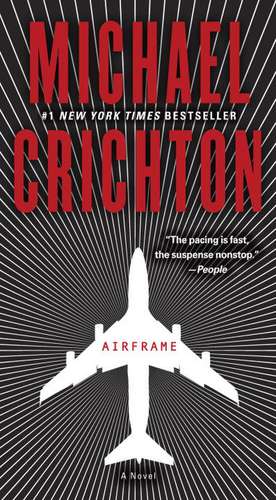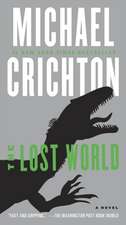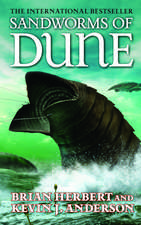Airframe
Autor Michael Crichtonen Limba Engleză Paperback – 28 feb 2011
#1 NEW YORK TIMES BESTSELLER
“The pacing is fast, the suspense nonstop.”—People
At a moment when the issue of safety and death in the skies is paramount in the public mind, a lethal midair disaster aboard a commercial twin-jet airliner flying from Hong Kong to Denver triggers a pressured and frantic investigation in which the greatest casualty may be the truth.
“A one-sitting read that will cause a lifetime of white-knuckled nightmares.”—The Philaelphia Inquirer
“The ultimate thriller . . . [Crichton’s] stories are always page-turners of the highest order. . . . [Airframe] moves like a firehouse dog chasing a red truck.”—The Denver Post
“Dramatically vivid.”—The New York Times
| Toate formatele și edițiile | Preț | Express |
|---|---|---|
| Paperback (2) | 53.71 lei 26-32 zile | +19.100 lei 7-13 zile |
| Random House – 23 oct 1997 | 53.71 lei 26-32 zile | +19.100 lei 7-13 zile |
| BALLANTINE BOOKS – 28 feb 2011 | 63.46 lei 3-5 săpt. |
Preț: 63.46 lei
Nou
Puncte Express: 95
Preț estimativ în valută:
12.14€ • 12.61$ • 10.13£
12.14€ • 12.61$ • 10.13£
Carte disponibilă
Livrare economică 01-15 martie
Preluare comenzi: 021 569.72.76
Specificații
ISBN-13: 9780345526779
ISBN-10: 0345526775
Pagini: 448
Dimensiuni: 104 x 185 x 30 mm
Greutate: 0.25 kg
Editura: BALLANTINE BOOKS
ISBN-10: 0345526775
Pagini: 448
Dimensiuni: 104 x 185 x 30 mm
Greutate: 0.25 kg
Editura: BALLANTINE BOOKS
Notă biografică
Michael Crichton’s novels include The Andromeda Strain, The Great Train Robbery, Congo, Jurassic Park, Rising Sun, Disclosure, and The Lost World. He was as well the creator of the television series ER. Crichton died in 2008.
Extras
Airframe Chapter 3
LAX
5:57 a.m.
Daniel Greene was the duty officer at the FAA Flight Standards District Office on Imperial Highway, half a mile from LAX. The local FSDOs--or Fizdos, as they were called--supervised the flight operations of commercial carriers, checking everything from aircraft maintenance to pilot training. Greene had come in early to clear the paper off his desk; his secretary had quit the week before, and the office manager refused to replace her, citing orders from Washington to absorb attrition. So now Greene went to work, muttering. Congress was slashing the FAA budget, telling them to do more with less, pretending the problem was productivity and not workload. But passenger traffic was up four percent a year, and the commercial fleet wasn't getting younger. The combination made for a lot more work on the ground. Of course, the FSDOs weren't the only ones who were strapped. Even the NTSB was broke; the Safety Board only got a million dollars a year for aircraft accidents, and--
The red phone on his desk rang, the emergency line. He picked it up; it was a woman at traffic control.
"We've just been informed of an incident on an inbound foreign carrier," she said.
"Uh-huh." Greene reached for a notepad. "Incident" had a specific meaning to the FAA, referring to the lower category of flight problems that carriers were required to report. "Accidents" involved deaths or structural damage to the aircraft and were always serious, but with incidents, you never knew. "Go ahead."
"It's TransPacific Flight 545, incoming from Hong Kong to Denver. Pilot's requested emergency landing at LAX. Says they encountered turbulence during flight."
"Is the plane airworthy?"
"They say it is," Levine said. "They've got injuries, and they've requested forty ambulances."
"Forty?"
"They've also got two stiffs."
"Great." Greene got up from his desk. "When's it due in?"
"Eighteen minutes."
"Eighteen minutes--Jeez, why am I getting this so late?"
"Hey, the captain just told us, we're telling you. I've notified EMS and alerted the fire crews."
"Fire crews? I thought you said the plane's okay."
"Who knows?" the woman said. "The pilot is not making much sense. Sounds like he might be in shock. We hand off to the tower in seven minutes."
"Okay," Greene said. "I'm on my way."
He grabbed his badge and his cell phone and went out the door. As he passed Karen, the receptionist, he said, "Have we got anybody at the international terminal?"
"Kevin's there."
"Beep him," Greene said. "Tell him to get on TPA 545, inbound Hong Kong, landing in fifteen. Tell him to stay at the gate--and don't let the flight crew leave."
"Got it," she said, reaching for the phone.
Greene roared down Sepulveda Boulevard toward the airport. Just before the highway ran beneath the runway, he looked up and saw the big TransPacific Airlines widebody, identifiable by its bright yellow tail insignia, taxiing toward the gate. TransPacific was a Hong Kong-based charter carrier. Most of the problems the FAA had with foreign airlines occurred with charters. Many were low-budget operators that didn't match the rigorous safety standards of the scheduled carriers. But TransPacific had an excellent reputation.
At least the bird was on the ground, Greene thought. And he couldn't see any structural damage to the widebody. The plane was an N-22, built by Norton Aircraft in Burbank. The plane had been in revenue service five years, with an enviable dispatch and safety record.
Greene stepped on the gas and rushed into the tunnel, passing beneath the giant aircraft.
He sprinted through the international building. Through the windows, he saw the TransPacific jet pulled up to the gate, and the ambulances lined up on the concrete below. The first of them was already driving out, its siren whining.
Greene came to the gate, flashed his badge, and ran down the ramp. Passengers were disembarking, pale and frightened. Many limped, their clothes torn and bloody. On each side of the ramp, paramedics clustered around the injured.
As he neared the plane, the nauseating odor of vomit grew stronger. A frightened TransPac stewardess pushed him back at the door, chattering at him rapidly in Chinese. He showed her his badge and said, "FAA! Official business! FAA!" The stewardess stepped back, and Greene slid past a mother clutching an infant and stepped into the plane.
He looked at the interior, and stopped. "Oh my God," he said softly. "What happened to this plane?"
From the Hardcover edition.
LAX
5:57 a.m.
Daniel Greene was the duty officer at the FAA Flight Standards District Office on Imperial Highway, half a mile from LAX. The local FSDOs--or Fizdos, as they were called--supervised the flight operations of commercial carriers, checking everything from aircraft maintenance to pilot training. Greene had come in early to clear the paper off his desk; his secretary had quit the week before, and the office manager refused to replace her, citing orders from Washington to absorb attrition. So now Greene went to work, muttering. Congress was slashing the FAA budget, telling them to do more with less, pretending the problem was productivity and not workload. But passenger traffic was up four percent a year, and the commercial fleet wasn't getting younger. The combination made for a lot more work on the ground. Of course, the FSDOs weren't the only ones who were strapped. Even the NTSB was broke; the Safety Board only got a million dollars a year for aircraft accidents, and--
The red phone on his desk rang, the emergency line. He picked it up; it was a woman at traffic control.
"We've just been informed of an incident on an inbound foreign carrier," she said.
"Uh-huh." Greene reached for a notepad. "Incident" had a specific meaning to the FAA, referring to the lower category of flight problems that carriers were required to report. "Accidents" involved deaths or structural damage to the aircraft and were always serious, but with incidents, you never knew. "Go ahead."
"It's TransPacific Flight 545, incoming from Hong Kong to Denver. Pilot's requested emergency landing at LAX. Says they encountered turbulence during flight."
"Is the plane airworthy?"
"They say it is," Levine said. "They've got injuries, and they've requested forty ambulances."
"Forty?"
"They've also got two stiffs."
"Great." Greene got up from his desk. "When's it due in?"
"Eighteen minutes."
"Eighteen minutes--Jeez, why am I getting this so late?"
"Hey, the captain just told us, we're telling you. I've notified EMS and alerted the fire crews."
"Fire crews? I thought you said the plane's okay."
"Who knows?" the woman said. "The pilot is not making much sense. Sounds like he might be in shock. We hand off to the tower in seven minutes."
"Okay," Greene said. "I'm on my way."
He grabbed his badge and his cell phone and went out the door. As he passed Karen, the receptionist, he said, "Have we got anybody at the international terminal?"
"Kevin's there."
"Beep him," Greene said. "Tell him to get on TPA 545, inbound Hong Kong, landing in fifteen. Tell him to stay at the gate--and don't let the flight crew leave."
"Got it," she said, reaching for the phone.
Greene roared down Sepulveda Boulevard toward the airport. Just before the highway ran beneath the runway, he looked up and saw the big TransPacific Airlines widebody, identifiable by its bright yellow tail insignia, taxiing toward the gate. TransPacific was a Hong Kong-based charter carrier. Most of the problems the FAA had with foreign airlines occurred with charters. Many were low-budget operators that didn't match the rigorous safety standards of the scheduled carriers. But TransPacific had an excellent reputation.
At least the bird was on the ground, Greene thought. And he couldn't see any structural damage to the widebody. The plane was an N-22, built by Norton Aircraft in Burbank. The plane had been in revenue service five years, with an enviable dispatch and safety record.
Greene stepped on the gas and rushed into the tunnel, passing beneath the giant aircraft.
He sprinted through the international building. Through the windows, he saw the TransPacific jet pulled up to the gate, and the ambulances lined up on the concrete below. The first of them was already driving out, its siren whining.
Greene came to the gate, flashed his badge, and ran down the ramp. Passengers were disembarking, pale and frightened. Many limped, their clothes torn and bloody. On each side of the ramp, paramedics clustered around the injured.
As he neared the plane, the nauseating odor of vomit grew stronger. A frightened TransPac stewardess pushed him back at the door, chattering at him rapidly in Chinese. He showed her his badge and said, "FAA! Official business! FAA!" The stewardess stepped back, and Greene slid past a mother clutching an infant and stepped into the plane.
He looked at the interior, and stopped. "Oh my God," he said softly. "What happened to this plane?"
From the Hardcover edition.
Descriere
Crichton's classic #1 "New York Times"-bestseller--a one-sitting read that will cause a lifetime of white-knuckled nightmares ("Philadelphia Inquirer")--is now available in a tall Premium Edition. Reissue.









